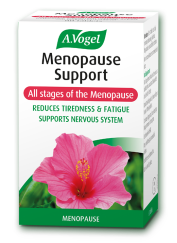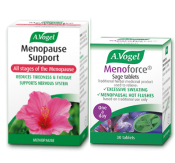Today's topic
Hello, and welcome to my weekly video blog And today on A.Vogel Talks Menopause, I'm going to be talking about tests for the menopause.
This is something I get asked so often by ladies who may be at the point of just starting the peri-menopause, and they're not sure what's happening. They don't know if the symptoms they're getting are to do with the approach to the menopause, or whether there's other things going on. And they will say to me, "Is there a test I can get?"
What your doctor might test for
Now, there is one, you can go to your doctor and ask for a sex hormone test. Now, what this involves is a little bit topsy-turvy, if you like. They don't really test for your oestrogen levels, mainly because your oestrogen level can fluctuate on a daily basis and can give a lot of misreadings.
So they test for something called FSH or follicle-stimulating hormone. Now, this works in relationship with oestrogen, so at the beginning of the peri-menopause or the menopause when your oestrogen is starting to fall and the production from your ovaries is lessening, the body tries to make up this shortfall, so by over-producing the amount of follicle-stimulating hormone in the hope that that will then increase oestrogen, that is the test that they do.
The problem is like the oestrogen, testing for oestrogen on its own, it's not particularly reliable especially if you are still getting any periods. Now that could mean, if you're getting them every month or so, or even if you're only getting one period every three months, you can go and get the tests done.
You will be told, "You're not in the menopause," and you'll be going, "I'm sure I am. I'm getting all the other symptoms." So yes, your doctor might do it for you, although I'm hearing from an awful lot of women now that doctors are tending just to refuse to get these done, purely because they are so inaccurate. But do remember that menopause symptoms, or menopause-like symptoms, can be caused by other health issues.
Other tests which can rule out other health conditions
So as well as asking the doctor for the sex hormone test, I would also ask them to check your iron levels, to check your vitamin D levels, to check your thyroid function, and to also test your B12. All of these health issues can appear in and around the menopause, and between them, they can cause a whole raft of menopause-like symptoms, and, you know, as far as I can see, it's better to get these tested.
If everything is okay then at least you can rule them out and then you can focus on the menopause.
Can you buy a menopause test?
Some women have asked, "Can you buy tests over the counter?" Yes, you can do. But again, these will tend to be roughly the same kind, it may well be a blood test, but we don't know how accurate they are, and sometimes, the best way to see whether you're in the menopause is just to have a look at a few of the facts.
How to know if you’re going through the menopause without a test
1. Your Age
Average age is between 45 and 55, so if you're starting to get menopause-like symptoms within that age range, it's more than likely that that's you on your way.
2. Hereditary
However, there is a group of women who are under 45 and very often this is hereditary, so a good way to check here if you're under 45, and you're getting what you think are menopause symptoms, is maybe to check with other close female relatives, and ask them when they started the menopause.
If they started roughly the same age that you are, then it's quite possible that this is hereditary, and you're going to be starting the approach to the menopause as well. A small group of women will start the menopause over 55, but it's not a particularly big group.
3. Early symptoms to look out for
So the usual symptoms when you start the approach to the menopause will be changes in your periods, so your periods may start to get heavier, or longer, or closer together.
They might start to miss, they might start to get lighter, they might start to get further apart. So any changes that are going on with your periods over the space of two to three months may be an indication that you are approaching the menopause. Look at your mood as well. PMT very often gets exaggerated as you approach the menopause.
So if you find as your period approaches that you're getting more grumpy, you're getting more irritable, your mood swings are getting more pronounced and maybe deeper and starting earlier, again that can be an indication that your hormones are just starting to subtly change. And we can look at other common menopause symptoms would be things like if your joints start to ache, and especially if you go to the doctor and the doctor says there's nothing wrong with you, the tests are okay, that's sometimes an indication that the menopause is approaching.
So you look out for changes in your periods, whatever they may be, look out for other symptoms such as flushes, your joints ache, and your changes of mood as well. The other thing to do, and for those of you that have been watching for a while will know I love diaries, start keeping a diary so that you know what's happening every month.
Are you getting your mood swings or PMS symptoms earlier than normal? Are your periods starting to change and then maybe over between three to six months, you should see some kind of pattern emerging, and that may again be an indication that your hormones are changing and that you're approaching the menopause.
I hope that has given you a little bit of insight and made things a little bit clearer. Obviously, if any of you have any issues, or you've got any questions to ask, please just drop me a little line.
And I'll see you next week for another edition of A.Vogel Talks Menopause.









